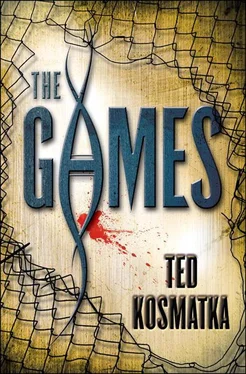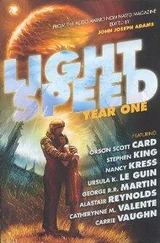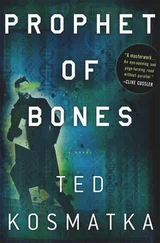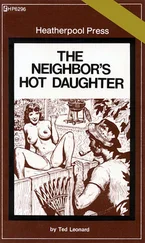The battery gauge had blazed red a half hour ago, but he’d talked himself into believing they could make another twenty-five more miles. Even after the headlights began to dim, he thought they could make it.
He looked down, and the speedometer told him he was going forty-seven. His foot sank the pedal into the floor. At first the needle didn’t move, then it dropped to forty-six. It was time they got off the highway.
It had been about an hour since they’d left the Brannin. It had been the headlights. He’d left them on while he and Vidonia climbed the stairs. Silas tried not to think about what had happened there. Vidonia wasn’t taking it well.
She sat reclined slightly in her seat, face turned out toward the open window. For a while he had taken her silence for sleep, but then he’d noticed her hands wringing in her lap and knew better. Her body was like that sometimes. It told him things she wouldn’t.
He lifted the turn signal and slid down the next exit into the darkness of the city. It was like descending into cold, murky water. There was no traffic here, and without the light of oncoming beams, the night settled over everything like a blanket. The ramp ended abruptly at a stop sign thrown up against a two-lane road. He glanced both ways, each appearing as unlikely.
“Don’t ask me,” Vidonia said preemptively, as the question was just forming in his mind. “This is your city. I’m the tourist, remember.”
“I’m not feeling lucky tonight.”
She leaned forward and squinted. “Go right.”
“Do you see something?”
“No.”
He looked at her. “Right it is.”
He spun the wheel and eased onto the accelerator. Small rectangular houses lined the street like tipped-over saltine boxes, separated from one another by narrow widths of pavement. Though the street was dark, here and there, it crawled. The little digital clock on the car radio glowed 3:46, but he could see people in the shadows at the edges of buildings, making the darkness into something that moved.
A stop sign appeared in the gloom, and he rolled through without stopping, budgeting his forward momentum. Now the houses gave way to storefronts, and the little paved gap between the structures disappeared. The city was a canyon here, two parallel walls. He rolled through another stop and now turned the dying headlights off, deciding instead to rely on the emergency blinkers to tell others he was coming. They would just have to get out of the way.
Up ahead he saw what he was looking for, and the tension in his chest eased. A held breath hissed out between his teeth. He turned the wheel, but as tires bumped onto the broad cement pad, the Aamco station seemed as dark and dead as the rest of the city.
He coasted past the pumps to the battery service and eased to a stop with his nose above the parking block. Realizing their options at this point were getting pretty thin, he decided to err on the side of optimism. He climbed out and stretched his legs, hoping the place wasn’t as deserted as it looked.
Nothing moved; nothing flashed, blinked, or glowed, but the front door was propped open with a cinder block. There was potential.
He leaned down, resting his forearms through the driver’s window. “I’ll be right back,” he told Vidonia, and flipped the dying headlights back on to light the doorway.
“Okay.”
He walked toward the entrance and found a man sitting tilted back on a stool, one greasy black boot on the service counter. There was just enough ambient light to sketch out his features. He was young and wore his hair tied back away from his face in a long ponytail.
“Pumps closed,” the man said.
“I need an exchange.”
“They’ve been sitting on a dead recharger for a while.” He wore both a dirty smock and a look of abject disinterest.
“I’ll take one, full or not.”
“I can’t make change; register’s froze up.”
“You can keep the change,” Silas said, and the look of boredom stirred into something slightly more ambitious.
“Well, then, what size you need?” the man asked, getting up from his stool and walking around the counter.
“It’s an economy car.”
“No, I mean the make,” the man said, giving him an odd look. “Chevy, Nissan, what?”
“It’s a Chevy. A rental.”
“Okay, Chevys take a twenty-five kV.” He pulled a thick block off the shelving by its handles and set it on the floor at Silas’s feet.
“Three C’s, plus the empty.”
Silas thought of asking for a price list but ended up handing the youth the bills. He bent to pick up the battery, but the man stopped him.
“The empty,” he was reminded.
Silas stepped back outside.
“Pop the hood,” he told Vidonia.
The hood clicked loudly and rose an inch. He wiggled his fingers under the edge for the clasp, found it, and raised the hood on its gas shocks. A dim bulb lit the motor assembly. He’d never owned a battery-operated car, but the procedure was pretty straightforward. He spun the big red wing nuts until the bulb went dark. Then he lifted the bracket off and pulled the battery out.
Inside, the man was behind the counter again, back on his stool.
“Where do you want it?” Silas asked.
“Set it near the charger. I’ll take care of it.”
On the way out, Silas snagged the new battery by its long handle, carrying it like a fat briefcase. At the car, he lowered it carefully into its casings. He tightened the wing nuts, and on the fourth or fifth turn, the bulb came on strong and bright. He slammed the hood.
“Not used to electrics?” Vidonia asked, when he was back in the car.
“You could tell?”
“No, you’re a natural.”
“I’d rather pump gas. I can’t see why people drive these things.”
He started the car and pulled around the lot.
“That’s why,” she said, pointing to the sign showing the price per gallon in regular, extra, and premium.
“Oh, yeah.”
Back on the street, he hit the headlights and bathed the block in sharp white light. The shadows retreated, leaving the figures exposed like crabs left on a beach after a tide. They stalked in loosely assembled groups, shuffling over the broken glass between storefronts. Some carried things. Some didn’t. But none liked the light in their faces, pushing the shadows away. A bottle flashed across the beams. A thrown thing. A warning. Silas hit the dims. See no evil.
He wondered about the guy at the station. He’d seemed a little too at ease sitting there in his own blanket of darkness.
They passed the business district. They passed long rows of crackerbox houses, and soon after, the green sign for Highway 15 rose up in the headlights. As they neared the steep climb of the ramp, Silas gunned it, and the car lurched forward, climbing like a champ. On a full battery, these little cars could actually be kind of peppy. He leaned forward, unconsciously urging the car faster as they climbed back onto the skyway. The sign in the distance read: Technical District 5 miles .
SEVEN MINUTES later, they were down from the skyway again and deep into the technical district at the edge of the desert.
They drove in silence.
There was no small talk, no nervous conversation. They were like a couple on a first date, steeped in anxiety.
Adrenaline jolted through Silas’s system as the high chain-link fence of the compound came into sight around the bend in the road. They were almost there. He drove parallel to the fence, waiting for the bushes and the gap.
When he came to the break in the fence, he didn’t turn. Instead, he passed by slowly—but not too slowly—checking the gatehouse to make sure it was vacant. He knew that the place was supposed to be deserted—most pertinent personnel were in Phoenix—but now that they’d come this far, he didn’t want to take the chance of any unwanted entanglements. When he satisfied himself that there were no guards on duty, he circled the car in the middle of the road and slipped toward the gate.
Читать дальше












